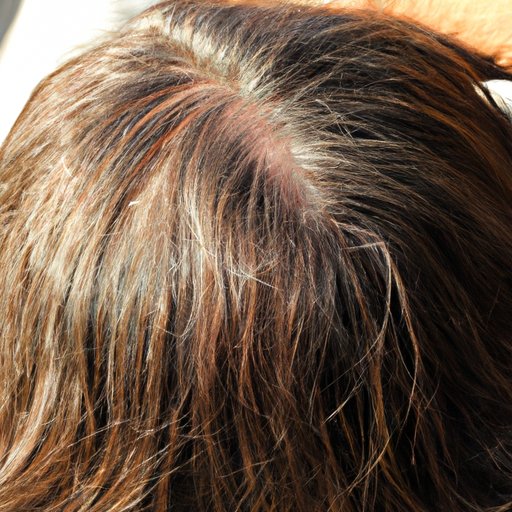Introduction
Have you ever wondered why your hair turns gray as you age? For many people, seeing the first signs of grey hair can be a cause of concern or even anxiety. However, understanding why hair turns gray can help us embrace this natural process and celebrate the beauty of aging. In this article, we’ll explore the science behind hair greying, as well as genetic, lifestyle, and psychological factors that may contribute to this process. We’ll also consider cultural attitudes toward grey hair and provide tips for maintaining healthy hair regardless of color.
Scientific Explanation
To understand why hair turns gray, we first need to understand the role of melanin in hair coloration. Melanin is a pigment produced by melanocyte cells in the hair follicles. This pigment gives hair its natural color, whether it’s blonde, brown, or black. As we age, melanin production can decrease, leading to a gradual loss of pigmentation in the hair. This process typically begins around age 35 for most people, but can happen earlier or later depending on genetics and other factors.
In addition to decreased melanin production, other biological factors can contribute to hair turning gray. For example, some medical conditions or medications may affect hair growth and pigmentation.
Genetic Factors
Genetics can play a significant role in determining when and how our hair turns gray. Certain genes may make individuals more susceptible to premature greying, or to greying at a young age. For example, a 2016 study found that variations in the IRF4 gene were strongly associated with hair greying in a European population.
Understanding the genetic basis of hair greying can also help us better understand broader processes of aging and disease.
Stress and Aging
Stress has long been linked to premature aging in a variety of ways, including its effects on both physical and mental health. While stress does not directly cause hair to turn gray, it may contribute to the process in a roundabout way. Research suggests that chronic stress can lead to a range of health problems that can indirectly affect hair pigmentation and growth.
For example, high levels of stress can lead to inflammation throughout the body, which can damage hair follicles and disrupt the production of melanin. Stress can also disrupt sleep patterns, which can further impact hair health and overall well-being.
Lifestyle Choices
Our lifestyle choices can also have a powerful impact on hair health and pigmentation. Factors like poor diet, smoking, and exposure to environmental toxins can all contribute to decreased melanin production and premature greying. On the other hand, a healthy diet rich in vitamins and minerals can help promote healthy hair growth and slow the process of greying.
Another important factor is the use of hair products and styling tools. Using harsh chemicals or excessive heat can damage hair follicles and contribute to hair greying. Using gentler products and avoiding heated styling tools can help maintain healthy hair.
Psychological Factors
For many people, the process of hair greying can also have psychological implications. Society often associates grey hair with aging, wisdom, and experience, and some people may feel pressure to conceal or delay the process of greying. However, embracing natural hair color and aging can also be a powerful act of self-love and acceptance.
In addition, research suggests that our attitudes toward aging can have a powerful impact on our health and well-being. Cultivating a positive attitude toward both our own aging process and that of others can support emotional and psychological resilience.
Cultural Significance
Grey hair also has cultural significance in various societies around the world. In some cultures, grey hair is a sign of wisdom, experience, or status, while in others it may be seen as a sign of old age or illness. However, attitudes toward grey hair are changing in many parts of the world, as people increasingly embrace natural hair colors and reject ageist stereotypes.
Remedies and Treatments
If you’re looking to slow or delay the process of hair greying, there are a variety of natural and commercial remedies to consider. Some natural options include supplements like biotin and omega-3 fatty acids, as well as lifestyle factors like stress reduction and healthy diet.
Commercial options include hair dyes and other treatments that can help conceal or reverse grey hair. However, it’s important to note that many of these treatments can also have negative side effects, such as hair damage or scalp irritation.
Conclusion
In conclusion, hair greying is a natural process that occurs as we age, and is influenced by a complex range of biological, genetic, lifestyle, and psychological factors. While there may be ways to slow or delay the process of greying, it’s important to embrace the natural process of aging and celebrate the beauty that comes with it. By making lifestyle choices that support healthy hair, cultivating positive attitudes toward aging, and embracing natural hair colors, we can all feel confident and radiant at any age.
